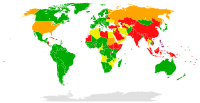
Photo from wikipedia
The present research paper describes the most traditional ways of Implementation of Rome Statute. The main section of the paper concerns the effect of adopting Core crimes in different countries… Click to show full abstract
The present research paper describes the most traditional ways of Implementation of Rome Statute. The main section of the paper concerns the effect of adopting Core crimes in different countries as well as determine key way of such implementation and its practical results. Such description aims to comprehend and compare the practical questions which arise in the prism of implementation of International Crimes, as well as find good practical answers which are based on states’ experience. Most issues, which will be introduced in this article should answer following important questions: first is whether the states have to implement international regulations on genocide crimes, terrorism, war crimes with crimes against humanity, and second question is arisen due to the definition of International Crimes in national laws. At main part of the research, we discuss the national legal background to implement the regulations of Rome Statute, as a part of International law, as well as analyze foreign countries experience in this direction. In this legal research, three categories of methods were used: philosophical methods, general scientific methods and legal methods. All the methods, including dialectic method, method of analysis and synthesis, historical, sociological and comparative, the method of the general theory of scientific knowledge of social and legal phenomena, as well as, method of systematic analysis, Анотація У дослідженні описані найбільш традиційні способи імплементації Римського статуту до національних законодавств. Основний розділ статті стосується вивчення досвіду Фінляндії, Німеччини та Канади по імплементації норм Римського Статуту щодо міжнародних злочинів. Стаття має на меті висвітлення основних практичних питань, що виникають при впровадженні положень щодо міжнародних злочинів. Проаналізовано такі основні проблеми: чи має національне кримінальне законодавство приймати окремі закони щодо військових злочинів, злочинів проти людства, агресії та геноциду? Який склад цих злочинів відповідно до норм національного законодавства? У статті акцентується увага на особливостях правового регулювання та діяльності країн щодо імплементації міжнародного права в цілому та Римського статуту Міжнародного кримінального суду зокрема. У дослідженні були використані три категорії методів: філософські методи, загальнонаукові методи та спеціальноюридичні методи. Усі методи, включаючи діалектичний метод, метод аналізу та синтезу, історичний, соціологічний та порівняльний, метод загальної теорії наукового пізнання соціальних та правових явищ, а також метод систематичного аналізу, порівняльно-правовий метод та логічно-правовий метод були використані для розгляду традиційних 231 PhD, Assistant of the Department of Criminal Law, Yaroslav Mudryi National Law University, Kharkiv, Ukraine. 232 PhD student of Аcademician Stashis Scientific Research Institute for the Study of Crime Problems, National Academy of Law Sciences of Ukraine, Kharkiv, Ukraine. 233 PhD, Associate Professor of Law at Volodymyr Dahl East Ukrainian National University, Severodonetsk, Ukraine. 234 PhD, Professor of Yaroslav Mudryi National Law University, Kharkiv, Ukraine. Shulzhenko, N., Romashkin, S., Shulzhenko, O., Mokhonchuk, S. / Volume 9 Issue 28: 528-535 / April, 2020 Volume 9 Issue 28 / April 2020 529 http:// www.amazoniainvestiga.info ISSN 2322 6307 comparative legal method, and logically legal method were used to consider the most traditional ways of Application of the Rome Statute in domestic laws together with all the regulations of international law in general.
Journal Title: Artificial Intelligence
Year Published: 2020
Link to full text (if available)
Share on Social Media: Sign Up to like & get
recommendations!